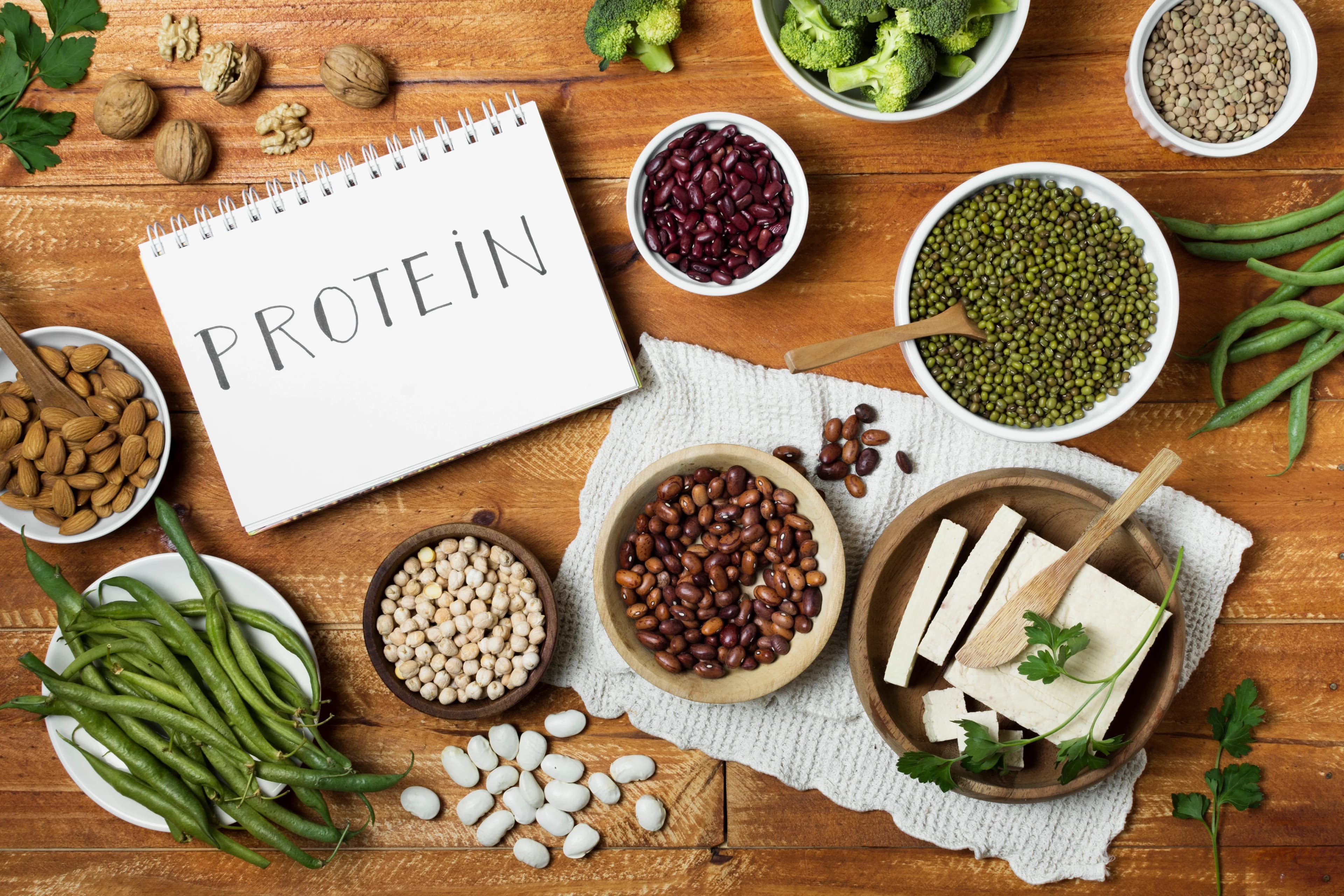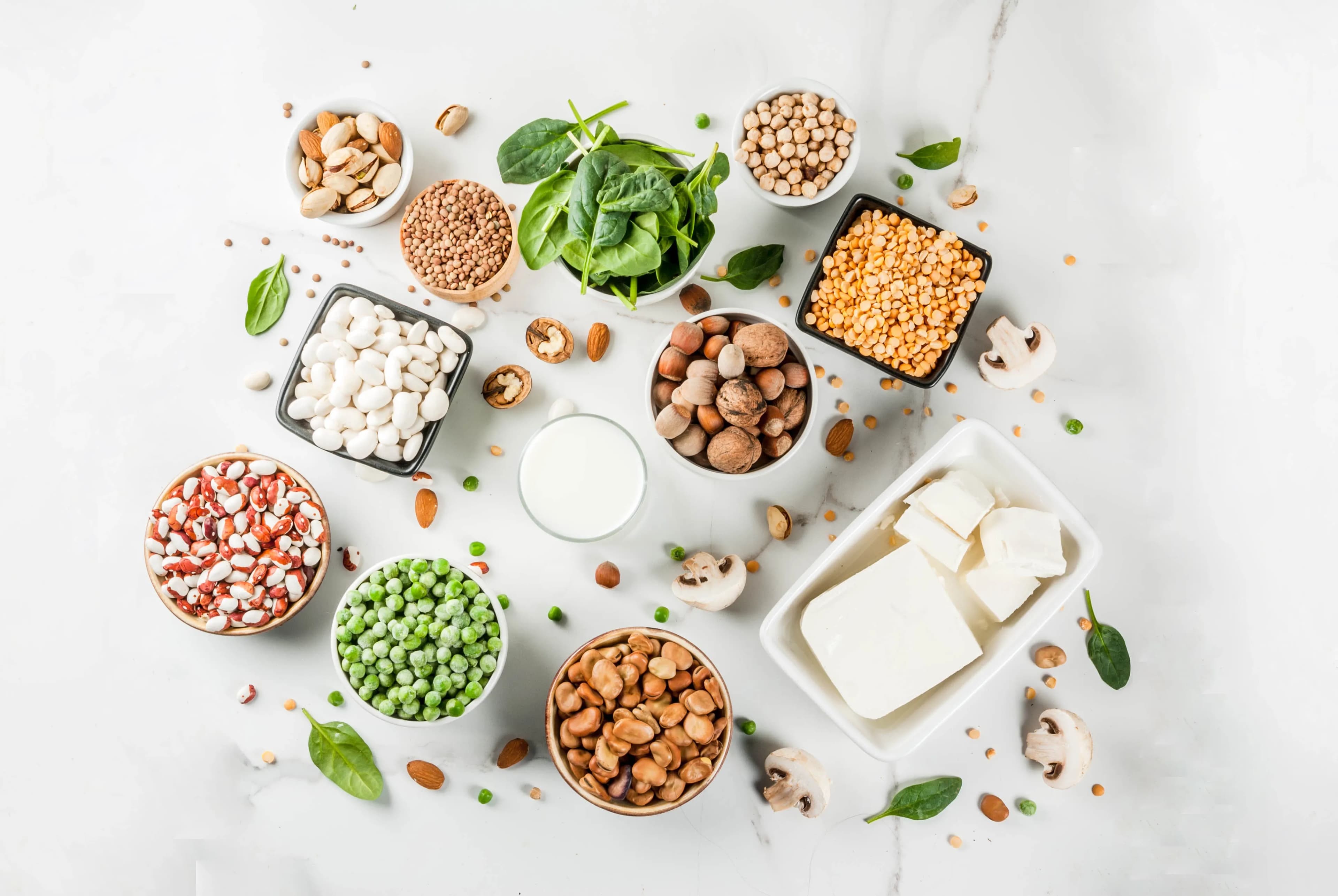
2025-08-04
|
Nutrition
Protein is the main building material for our bodies, so everyone needs it daily, especially those who train actively. Protein is involved in building and maintaining muscles, supports recovery after physical activity, and strengthens the immune system. You can meet your protein needs through a plant-based diet, where sources of protein and carbohydrates are combined with vitamins and minerals. This is a practical solution for daily meals and a way to maintain health in the long term.
The biological value of protein reflects how effectively the body can absorb and use the protein you consume. This depends on the amino acid composition: the better the composition, the higher the value of the food. However, you can still benefit from foods that are not high in all amino acids; it’s enough to combine them correctly.
There are 9 essential amino acids that we must obtain from food. In plant-based foods, a complete amino acid profile can be achieved through combinations such as:
Proteins rebuild muscles and also take part in the synthesis of enzymes and hormones. Enzymes speed up many chemical reactions in the body, and hormones regulate metabolism, influencing growth and recovery. During training, protein helps cope with micro-damages in muscle fibers, and after workouts, it contributes to an increase in muscle volume
Scientific sources, including PubMed and the American Journal of Clinical Nutrition, emphasize that when plant protein sources are combined correctly, plant-based protein is just as effective as animal protein in supporting muscles. Proper combinations of plant proteins provide the full range of amino acids and help maintain physical fitness.
The digestibility of plant protein is measured by the PDCAAS index (Protein Digestibility-Corrected Amino Acid Score). A high PDCAAS score, close to 1.0, is seen in soy protein, making it as effective as casein or whey protein. Other plant sources, such as quinoa or lentils, also come close to this threshold, especially when combined.
Plant protein provides the body with essential amino acids and offers additional health benefits:
Additionally, a plant-based diet can support and potentially improve kidney function in healthy individuals. In contrast, excess animal protein puts more strain on the kidneys because its breakdown produces more nitrogenous waste that the body must eliminate.
Studies show that animal protein has a dynamic effect on kidney function in short-term clinical trials, while soy protein does not. However, it is important to consider one's health status when choosing a diet, as results may vary for people with kidney disease. Studies of healthy individuals with normal kidney function confirm that consuming 0.8–1.0 grams of protein per kilogram of body weight from plant sources does not negatively affect creatinine levels or the glomerular filtration rate.

Try these ready-made recipes, which combine plant-based nutrients in a balanced way to support strength and endurance during and after physical activity.
This bowl contains ~20 g of protein, 55 g of carbohydrates, and 12 g of fat. It is rich in iron, zinc, magnesium, and B vitamins.
This dish provides a complete set of essential amino acids, promotes muscle protein synthesis, and aids recovery after exercise. Minerals support the immune system and promote enzyme synthesis.
How to make:
Boil the quinoa, fry the tempeh until golden brown, add the blanched green peas. Add the olive oil and lemon juice dressing, and stir.
· Nutritional content: ~18 g protein, 50 g carbohydrates, 7 g fat. Also contains folic acid, potassium, magnesium, and vitamin C.
Lentils are rich in lysine, which supports muscle growth. Vegetables provide antioxidant protection, and potassium helps regulate fluid and electrolyte balance. When combined with grains, lentil stew offers a complete amino acid profile.
How to cook: Cook the lentils and drain any excess water.
Add carrots, tomatoes, and onions, and simmer with spices (turmeric, cumin) for about 10 minutes. Serve with whole-grain bread.
· Nutritional content: ~22 g protein, 15 g fat, 12 g carbohydrates. Also contains calcium, iron, selenium, and vitamin K.
Soy protein is well absorbed. Together with calcium, it strengthens bones and supports muscle contraction. Broccoli provides vitamin C, which helps restore connective tissue, while tahini adds methionine. The amino acid profile of soy protein is approximately 0.99.
How to make: Cut the tofu and grill it (or fry on a dry pan).
Steam the broccoli for 3–4 minutes. Mix tahini with lemon juice and garlic, pour over the dish, and combine all ingredients.
· Nutritional content: ~19 g protein, 60 g carbohydrates, 9 g fat. Also contains vitamin B6, magnesium, and manganese.
The pasta provides slow-digesting carbohydrates, which are a source of energy. Chickpeas supply arginine for better blood flow and lysine for protein synthesis. This dish provides a complete amino acid profile.
How to cook: Cook whole-grain pasta.
Cook the chickpeas and blend them with olive oil, sun-dried tomatoes, and garlic. Mix the sauce with the pasta and add fresh herbs.
This dish contains approximately 17 grams of protein, 40 grams of carbohydrates, and 10 grams of fat. It also contains vitamin E, magnesium, zinc, and BCAAs (leucine, isoleucine, and valine).
Buckwheat supports blood vessels and the nervous system. Pumpkin seeds contain arginine and tryptophan, which promote cell regeneration. Amino acids
stimulate muscle metabolism. This dish provides the body with all the essential amino acids it needs.
How to make:
Boil the buckwheat and mix it with ground pumpkin seeds. Form the mixture into patties and bake or fry them. Boil the pumpkin and carrots, then chop and blend them. Serve the buckwheat with the carrot and pumpkin purée.
How to calculate your protein requirements from plant-based foods
To get the real benefits of a plant-based diet, you need to calculate your protein requirements. This will help maintain muscle mass and endurance.
On average, a person who is active throughout the day needs 1.2–2.0 g/kg of body weight. If your workload is light, 1.2 g is sufficient, but for intense training, it is better to increase your intake to 2.0 g/kg of body weight. For example, if you weigh 70 kg and train 4 to 5 times a week, you should consume 120–140 g of protein per day.
It is possible to get this amount from plant-based foods:
Product - Protein per 100 g (cooked/ready) Tempeh 19 g Tofu 12 g Quinoa 4.4 g Lentils 9 g Chickpeas 8.9 g Pumpkin seeds 30 g Peanut butter 25 g Buckwheat 3.6 g Oats (oatmeal) 2.5 g Green peas 5.4 g
It is also important to add carbohydrates and healthy plant fats to your diet. The optimal ratio for most active people is about half of calories from carbohydrates, a quarter from protein, and a quarter from unsaturated fats. Carbohydrates are a source of energy and are also necessary for the effective use of amino acids. Fats maintain hormonal balance, which is important for muscle growth and recovery.

Tips for Creating Protein-Rich Plant-Based Meals
Combine legumes with grains and add nuts and seeds to achieve a complete amino acid profile. Remember that legumes are a source of lysine, grains and seeds provide methionine, and threonine is found in pumpkin seeds, sesame seeds, and amaranth.
If needed, use protein supplements. Soy, hemp, rice, or pea protein can be a good solution on days when it’s not possible to get the required portion from food. This is especially important for athletes, as it helps compensate for high energy expenditure.
Avoid excessive consumption of protein bars and other processed products. Mass-produced fitness bars often contain added sugars, trans fats, and artificial sweeteners, which not only negate the benefits but can also be harmful. Choose whole foods over processed ones, and eat fresh vegetables and fruits. This way, you’ll get protein, fiber, vitamins, and antioxidants.
Conclusion
Plant-based foods can fully meet the protein needs of active individuals. Proper combinations of foods allow you to obtain all the necessary nutrients, including essential amino acids required for tissue growth and repair.
Protein requirements can be met without consuming animal products. Scientific research shows that plant protein is effective for supporting muscle mass, physical performance, endurance, and recovery speed after workouts.
A complete plant-based menu can be experienced at our restaurant. These are hearty and tasty dishes with a full protein profile, rich in micronutrients and antioxidants. This way, you can combine culinary pleasure with health benefits and also support the environment.
Visit our restaurant for vibrant and flavorful experiences!